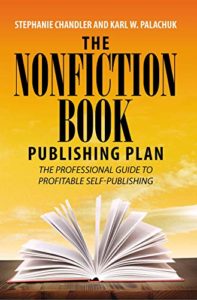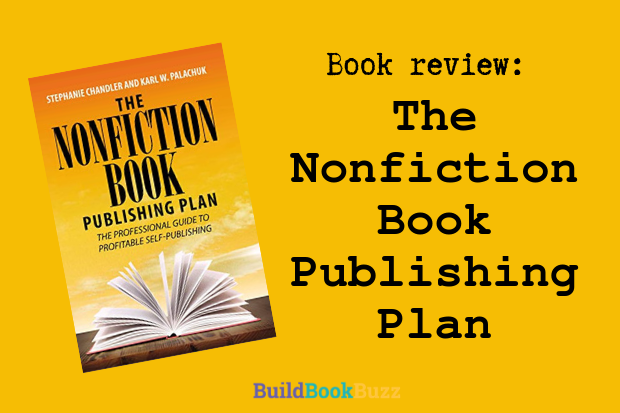Book review: The Nonfiction Book Publishing Plan
I just read The Nonfiction Book Publishing Plan: The Professional Guide to Profitable Self-Publishing for one reason: to determine if I could recommend it with confidence to authors who want to self-publish a book, but don’t know how.
Turns out I can — to both nonfiction and fiction authors.
Don’t stop reading this review because Stephanie Chandler and Karl Palachuk’s new-ish book has “nonfiction” in the title. Yes, the first few chapters focus on the advantages of writing and publishing a nonfiction book, but the majority of the 19 chapters are relevant to all books, regardless of genre and category.
Why I read this book
There are lots of other books I could have read, but I selected this one because I’ve read a couple of other books by Stephanie, so I know her work is excellent. Her content is thorough and accurate, and she offers specifics. She also owns a small publishing company, which means she writes about this topic from experience.
I can see that her co-author knows the topic just as well.
Here’s my review.
Lots here for all authors
Chapter 5 has some solid advice for creating your title, and the advice to write your back cover copy before staring to write the book is genius! It will help give you the focus you need to stay on track as you write.
But if you’re already sold on writing a nonfiction book, or if you write fiction, you can pretty much skip the first five chapters and start with Chapter 6, Beta Readers. Beta readers might be even more important for novelists.
You’ll find the specific information on where to find these helpers and how to work with them valuable.
There’s a great deal of information and emphasis on print books, presumably because nonfiction readers often like to read and mark up that format. Planning to publish only in e-book format? Just skip the few chapters pertaining to printed books.
What makes this book valuable
Here’s what I think makes this book useful to people who are new to self-publishing:
- You get clear, specific, and detailed instructions you can trust. The authors both have a great deal of knowledge that they share freely.
- The “Author Interviews” sprinkled throughout take you behind-the-scenes with successful self-published authors. They all answer the same questions. Because I teach how to market your books, I recommend reading everyone’s answer to this one: “What have been some book marketing strategies that have generated the best results for you?” You’ll find their insights helpful.
- The authors often use their own experiences to explain how they made decisions. I particularly appreciate the sections where they explain the options, then add, “Here’s how I handled it.” I like knowing what solution they settled on.
- The authors answer your questions before you ask them. As a moderator of a self-publishing and book marketing group, I know what questions new authors have about self-publishing. I had those common questions in mind as I read this book — and got the answers to all of them. You won’t have many questions left after you read this book.
Is anything missing?
 As a self-publishing novice, I wasn’t left with any questions. (But you don’t know what you don’t know, right?)
As a self-publishing novice, I wasn’t left with any questions. (But you don’t know what you don’t know, right?)
It gave me the level of detail I need to feel like I could take on a self-publishing project with confidence. That’s precisely what I need from a resource like this.
I should point out, though, that I think the content about endorsements in Chapter 14 could have been stronger. The authors focused on getting pre-publication endorsements only from other authors. You also want to ask industry leaders and influencers. Many of them won’t be authors.
(For more on that, see my training program, “Blurbs, Endorsements, and Testimonials: How to Get Experts, Authorities, Celebrities, and Others to Endorse Your Book.”)
Two thumbs up
Too many authors don’t bother to learn the essentials before getting started on Amazon, Smashwords, or anywhere else. Whether they realize it or not, this means they make mistakes that impact their book’s quality and sales.
I highly recommend The Nonfiction Book Publishing Plan: The Professional Guide to Profitable Self-Publishing for anyone smart enough to look before they leap.
Let this resource give you the best start possible.
What other resources do you recommend to help authors learn about self-publishing? Please tell us in a comment.
Like what you’re reading? Get it delivered to your inbox every week by subscribing to the free Build Book Buzz newsletter. You’ll also get my free “Top 5 Free Book Promotion Resources” cheat sheet immediately!


If you’re publishing a nonfiction book, don’t forget to include an index, which enhances your nonfiction book to the level of a reference book. Plus reviewers expect a nonfiction book to have an index.
Thanks, Sue. Many will benefit from an index, but not all. For example, my first traditionally published book was a humor book without an index. Likewise, memoirs probably don’t need an index, right?
What’s your take on indexes in e-book only formats? Do e-book readers use them?
Sandy
I write books about WWII vets. I could spend days creating an index about terms, events. I choose not to b/c I don’t ever hear from a reader that they wished the books had indices (plural for index?).
Thanks, Kayleen. I think that makes sense for your books. They aren’t resource or how-to materials. They’re stories.
Sandy
Thank you for the great review!
Thanks for writing such a solid, helpful book, Stephanie. You and Karl did a great job — it’s a public service!
Sandy
I’ll recommend that my library purchase it.
Great idea!
Sandy
Thanks. Re-information; on self-publishing and Audio books – your last two Emails. I have self-published my kid’s books using Booklocker.com, and like what they do, but have failed to use the valuable information they freely give on marketing. I only wrote the books for my 3 granddaughters about 14 years ago because they asked me to. Later when a member of the Carindale Writers Group in Brisbane a friend and editor in the group persuaded me to try and publish them. So, did, with help from the group. I will now think about selling. Before publishing it was suggested by a teacher of English and her friend, a lecturer in English literature at UQ, University of Queensland (Brisbane Australia), my series of stories were better suited for TV or a movie. Huh, how to do that, but on this Audio Books sounds like an excellent alternative. It would though require a better talker than myself. My voice is liked, especially in the US, but oh it’s so fast.
Book marketing takes effort, for sure, so you definitely have to be sure you want to do it. Sounds like Booklocker can help when you’re ready.
Sandy
Thanks for the excellent choice! I wish I had known about this book before I published my book. Just in time for book 2!
I don’t think you’ll be disappointed, Sonia!
Sandy